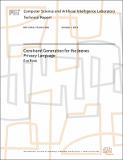Constraint Generation for the Jeeves Privacy Language
Author(s)
Rose, Eva
DownloadMIT-CSAIL-TR-2014-020.pdf (499.2Kb)
Other Contributors
Computer-Aided Programming
Advisor
Armando Solar-Lezama
Metadata
Show full item recordAbstract
Our goal is to present a completed, semantic formalization of the Jeeves privacy language evaluation engine, based on the original Jeeves constraint semantics defined by Yang et al at POPL12, but sufficiently strong to support a first complete implementation thereof. Specifically, we present and implement a syntactically and semantically completed concrete syntax for Jeeves that meets the example criteria given in the paper. We also present and implement the associated translation to J, but here formulated by a completed and decompositional operational semantic formulation. Finally, we present an enhanced and decompositional, non-substitutional operational semantic formulation and implementation of the J evaluation engine (the dynamic semantics) with privacy constraints. In particular, we show how implementing the constraints can be defined as a monad, and evaluation can be defined as monadic operation on the constraint environment. The implementations are all completed in Haskell, utilizing its almost one-to-one capability to transparently reflect the underlying semantic reasoning when formalized this way. In practice, we have applied the "literate" program facility of Haskell to this report, a feature that enables the source LATEX to also serve as the source code for the implementation (skipping the report-parts as comment regions). The implementation is published as a github project.
Date issued
2014-10-01Series/Report no.
MIT-CSAIL-TR-2014-020